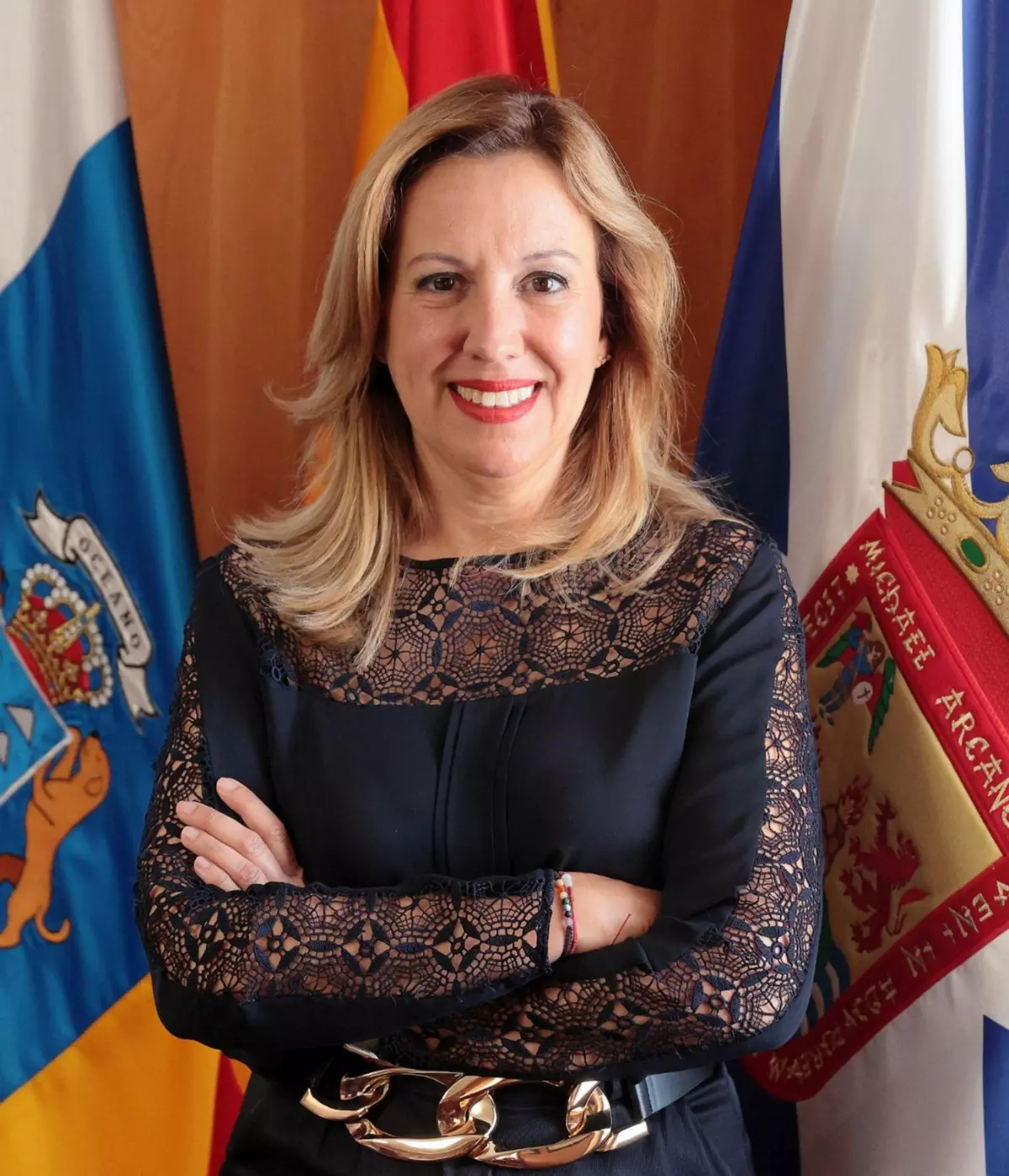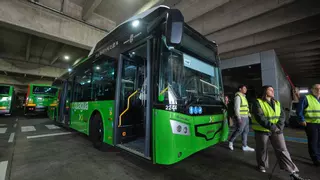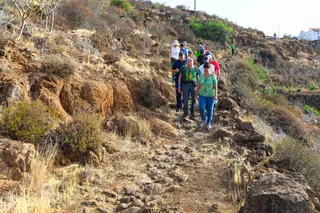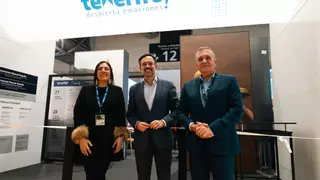Dávila Assures Free Transport for 105 Million Passengers
Without the free service, a family of two adults and a university student would incur an annual cost of 636 euros for travel cards
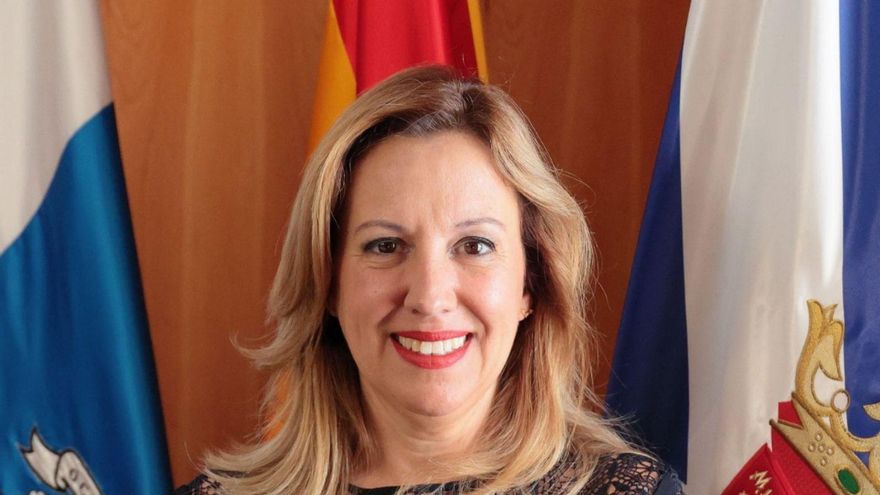
Rosa Dávila, president of the Cabildo de Tenerife. | / The day

The day
Santa Cruz de Tenerife Jan 28 2025 0:00
Rosa Dávila, the president of the Cabildo de Tenerife, has confirmed that public transport will remain free this year for over 80 million bus users and the 90,000 daily tram passengers, whose movements total around 25 million each year. This decision, made last Wednesday, coming shortly after the Congress of Deputies withdrew the state funding for this initiative, has brought relief to the residents of Tenerife.
In the absence of free public transport, families, students, and employees would be burdened with the expense of monthly travel cards. The monthly cost of the Canarian resident discount card is 19 euros, amounting to a yearly total of 228 euros. In contrast, the young person’s fare, available for those under 30, is priced at 15 euros per month, which totals 180 euros annually. Thus, for a family of two adults and one university student, the yearly expenditure on public transport could reach 636 euros, a considerable financial burden, especially considering the current economic climate.
“We understand that many families rely on public transport for their daily routines, and we are dedicated to ensuring that this vital service remains free, alleviating the financial pressure on their households,” states Rosa Dávila. “The Cabildo is committed to supporting them and ensuring their well-being is safeguarded from external influences,” she adds.
Beyond the immediate savings for users, the provision of free transport has significantly lessened road traffic across the island, preventing approximately 33 million car journeys, according to the president of the Tenerife council.
Impact on Local Communities
Since the introduction of free public transport on January 1, 2023, over 150 million individuals have utilised the guaguas and nearly 50 million have opted for the tram in Tenerife. Rosa Dávila asserts that these statistics not only demonstrate the success of the initiative but also reflect its direct impact on the lives of all residents of Tenerife. According to Dávila, ensuring free public transport “is not merely a privilege, but a fundamental right of citizens.” “In Tenerife, we will not retract because we understand its importance to our community,” she elaborates while announcing the Cabildo’s decision to uphold this measure for 2025.
The annulment of Royal Decree-Law 9/2024, which terminated state funding for free public transport in the Canary Islands, was a setback that jeopardised this crucial service for the populace.
In relation to this matter, the president of the Cabildo de Tenerife did not hold back in condemning the manipulation of this policy for political gains. “Free public transport should not be subject to political changes or partisan agendas. It is a question of social and territorial justice, and we in Tenerife will ensure that this provision does not vanish due to decisions that disregard the reality of the Canary Islands,” she declared resolutely.
An Indispensable Initiative
The measure of free transport has proven to be “indispensable” for the mobility of Tenerife and acts as “a tool for social cohesion.” The elimination of such a measure at the national level “disregards the distinctiveness of the Canary Islands as both an archipelago and an outermost region,” a point Rosa Dávila emphasises as “crucial” in demanding “a differentiated approach.”
Despite the withdrawal of state support, Rosa Dávila has assured that the Cabildo “will persist in advocating for the necessary funding to reach the Canary Islands.” “It is vital that our uniqueness is acknowledged and responded to accordingly,” she asserts.
The Cabildo is not only dedicated to maintaining free transport but is also working towards enhancing regional mobility with an inclusive and operational vision, as noted by the island’s president. “This commitment serves as an immediate solution, as well as a strategy to ensure efficient public transport that caters to citizens and aids in alleviating congestion on the island’s roads and highways.”
A Groundbreaking Commitment
The Cabildo de Tenerife has made a “groundbreaking” pledge to public transport, with a total investment of over 88.4 million euros, plus an additional 25 million euros allocated for 2025. The leader of the island’s government highlights that this funding has facilitated the addition of over 100 of the 250 new buses planned to rejuvenate and expand the Titsa fleet, marking the most significant commitment to public transport in the island’s history.
The objectives of this investment include enhancing mobility across the island, launching new routes, bolstering heavily frequented services, mitigating noise pollution, and improving air quality in Tenerife. Furthermore, 70% of these guaguas are hybrid, promoting an update of the fleet, which currently averages over 10 years in age, and aiming to reduce fossil fuel consumption by 30%.
All new buses conform to the highest accessibility standards and have been designed for enhanced passenger comfort. Looking ahead to 2026, Titsa plans to introduce double-decker 15-metre buses capable of seating 110 people on high-demand routes connecting Santa Cruz de Tenerife with Los Cristianos, Adeje, Los Realejos, and Candelaria.
Meanwhile, Eulalia García, the Minister of Mobility for the Cabildo de Tenerife, emphasised that these initiatives showcase “a strong commitment to transforming mobility on the island.” “These investments not only enhance service quality but also aim to provide genuine alternatives to private vehicles, promoting accessible, convenient, and efficient transport for all residents of Tenerife,” explains García. “These measures position Tenerife as a national benchmark in mobility policies,” she concludes.
